
llamatutor
An AI personal tutor built with Llama 3.1
Stars: 1513
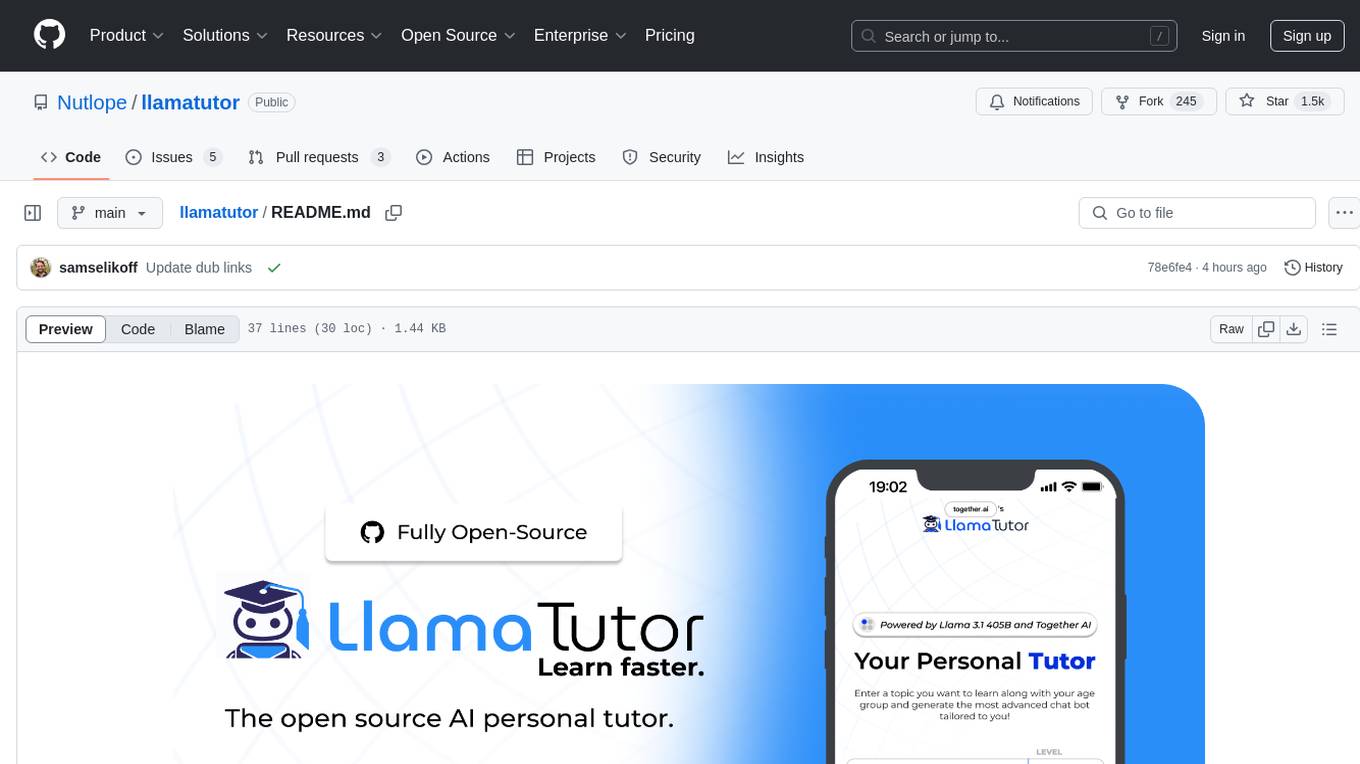
Llama Tutor is an open source AI personal tutor powered by Llama 3 70B & Together.ai. It utilizes a tech stack including Llama 3.1 70B, Together AI, Next.js app router with Tailwind, Serper for the search API, Helicone for observability, and Plausible for website analytics. Users can clone the repo, set up accounts for necessary APIs, configure environment variables, and run the app locally. Future tasks include adding share & copy buttons, follow-up questions, splitting pages, organizing icons, enhancing the landing page, implementing a mobile menu, exploring generative UI, and improving dropdowns.
README:
An open source AI personal tutor. Powered by Llama 3 70B & Together.ai
- Llama 3.1 70B from Meta for the LLM
- Together AI for LLM inference
- Next.js app router with Tailwind
- Serper for the search API
- Helicone for observability
- Plausible for website analytics
- Fork or clone the repo
- Create an account at Together AI for the LLM
- Create an account at SERP API or with Azure (Bing Search API)
- Create an account at Helicone for observability
- Create a
.env(use the.example.envfor reference) and replace the API keys - Run
npm installandnpm run devto install dependencies and run locally
- [ ] Add a share & copy buttons that folks can click on after convos are generated
- [ ] Add potential follow up questions + new chat at the end of chat page
- [ ] Split the page into two pages and add back the footer
- [ ] Move all my icons into their own typescript file (transform.tools)
- [ ] Add a more detailed landing page with a nice section with the GitHub link
- [ ] Add nice hamburger menu on mobile
- [ ] Try out the generative UI stuff from Vercel
- [ ] Add a nicer dropdown overall
For Tasks:
Click tags to check more tools for each tasksFor Jobs:
Alternative AI tools for llamatutor
Similar Open Source Tools

llamatutor
Llama Tutor is an open source AI personal tutor powered by Llama 3 70B & Together.ai. It utilizes a tech stack including Llama 3.1 70B, Together AI, Next.js app router with Tailwind, Serper for the search API, Helicone for observability, and Plausible for website analytics. Users can clone the repo, set up accounts for necessary APIs, configure environment variables, and run the app locally. Future tasks include adding share & copy buttons, follow-up questions, splitting pages, organizing icons, enhancing the landing page, implementing a mobile menu, exploring generative UI, and improving dropdowns.
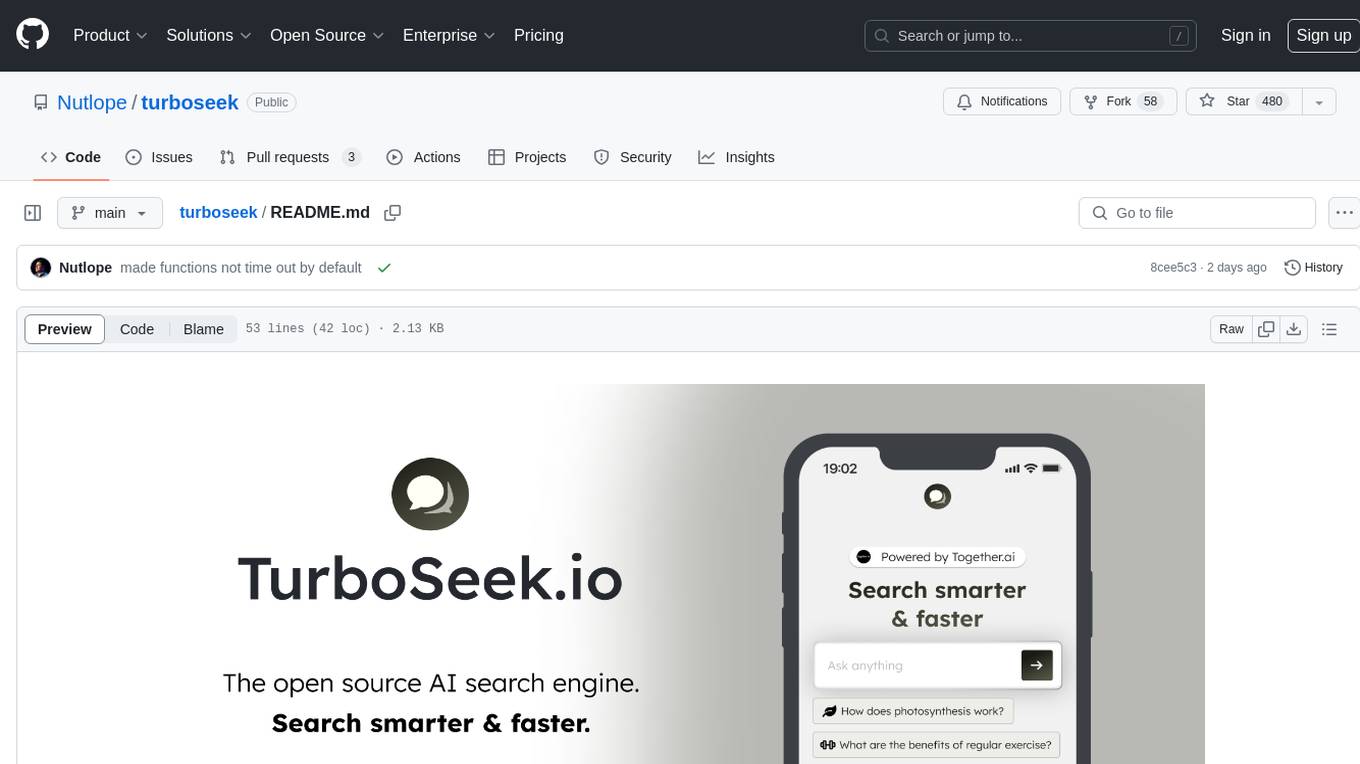
turboseek
TurboSeek is an open source AI search engine powered by Together.ai. It utilizes Next.js with Tailwind for the app router, Together AI for LLM inference, Mixtral 8x7B & Llama-3 for the LLMs, Bing for the search API, Helicone for observability, and Plausible for website analytics. The tool takes a user's question, queries the Bing search API for top results, scrapes text from the links, sends the question and context to Mixtral-8x7B, and generates follow-up questions using Llama-3-8B. Future tasks include optimizing source parsing, ignoring video links, adding regeneration option, ensuring proper citations, enabling sharing, implementing scrolling during answers, fixing hard refresh, adding caching with upstash redis, incorporating advanced RAG techniques, and adding authentication with Clerk and postgres/prisma.
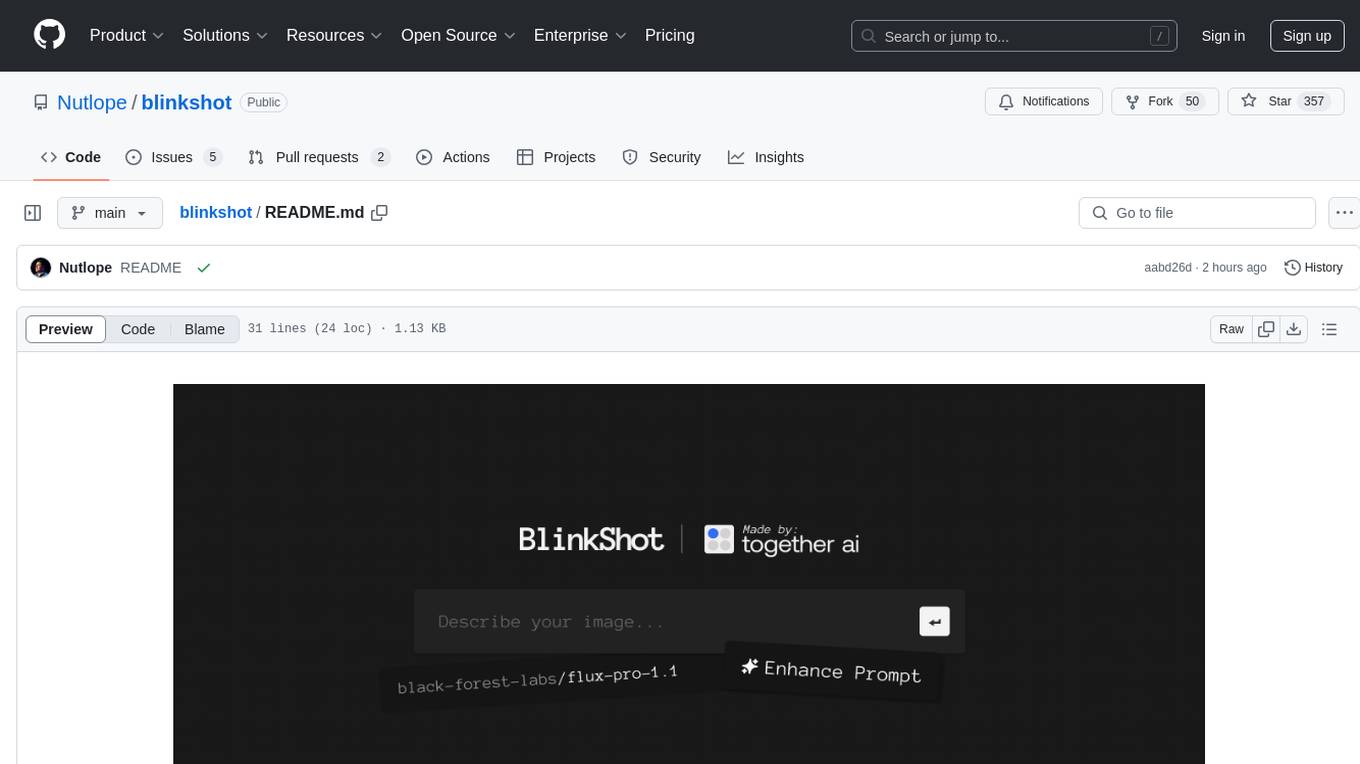
blinkshot
BlinkShot is an open source real-time AI image generator powered by Flux through Together.ai. It utilizes Flux Schnell from BFL for the image model, Together AI for inference, Next.js app router with Tailwind for the frontend, Helicone for observability, and Plausible for website analytics. Users can clone the repository, add their Together AI API key, and run the app locally to generate AI images. Future tasks include adding a call-to-action to fork the code on GitHub, implementing a download button on hover, allowing users to adjust resolutions and steps, adding an app description to the footer, and introducing themes.
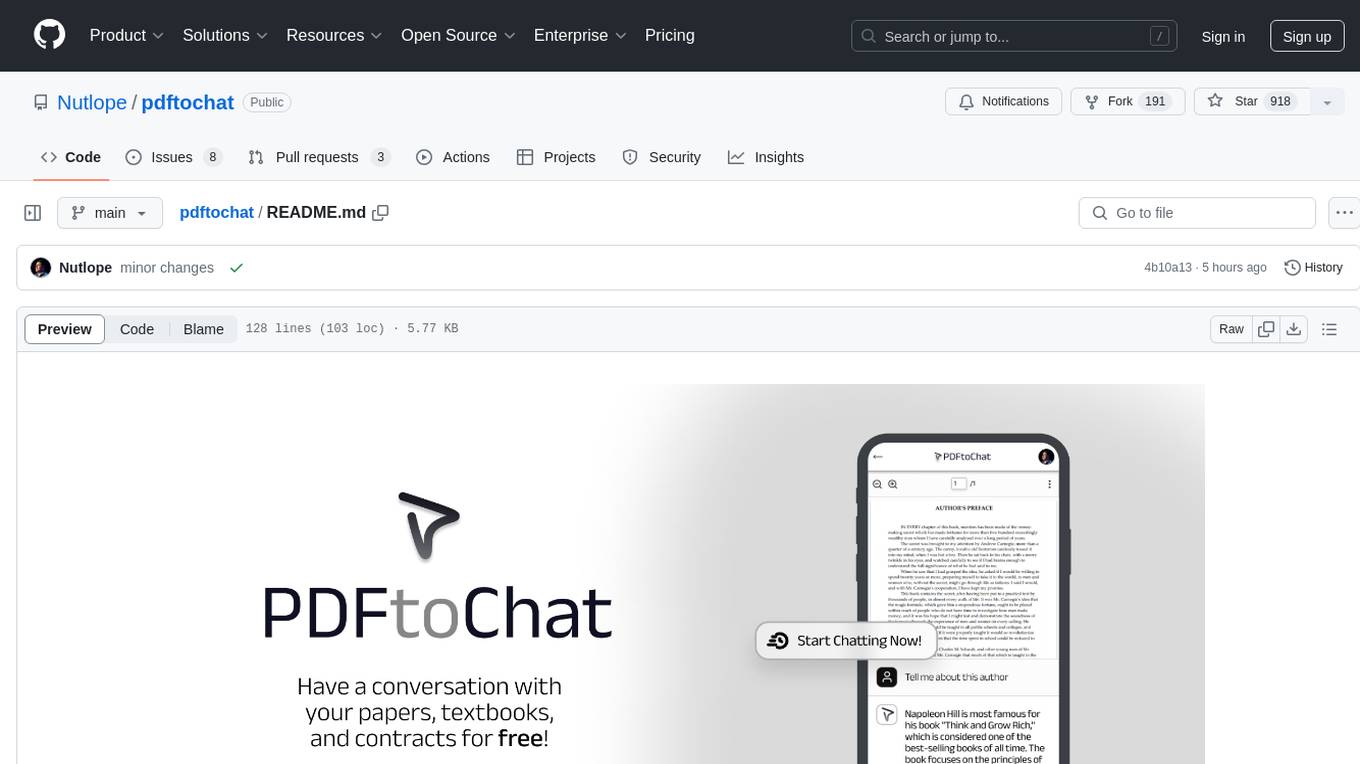
pdftochat
PDFToChat is a tool that allows users to chat with their PDF documents in seconds. It is powered by Together AI and Pinecone, utilizing a tech stack including Next.js, Mixtral, M2 Bert, LangChain.js, MongoDB Atlas, Bytescale, Vercel, Clerk, and Tailwind CSS. Users can deploy the tool to Vercel or any other host by setting up Together.ai, MongoDB Atlas database, Bytescale, Clerk, and Vercel. The tool enables users to interact with PDFs through chat, with future tasks including adding features like trash icon for deleting PDFs, exploring different embedding models, implementing auto scrolling, improving replies, benchmarking accuracy, researching chunking and retrieval best practices, adding demo video, upgrading to Next.js 14, adding analytics, customizing tailwind prose, saving chats in postgres DB, compressing large PDFs, implementing custom uploader, session tracking, error handling, and support for images in PDFs.
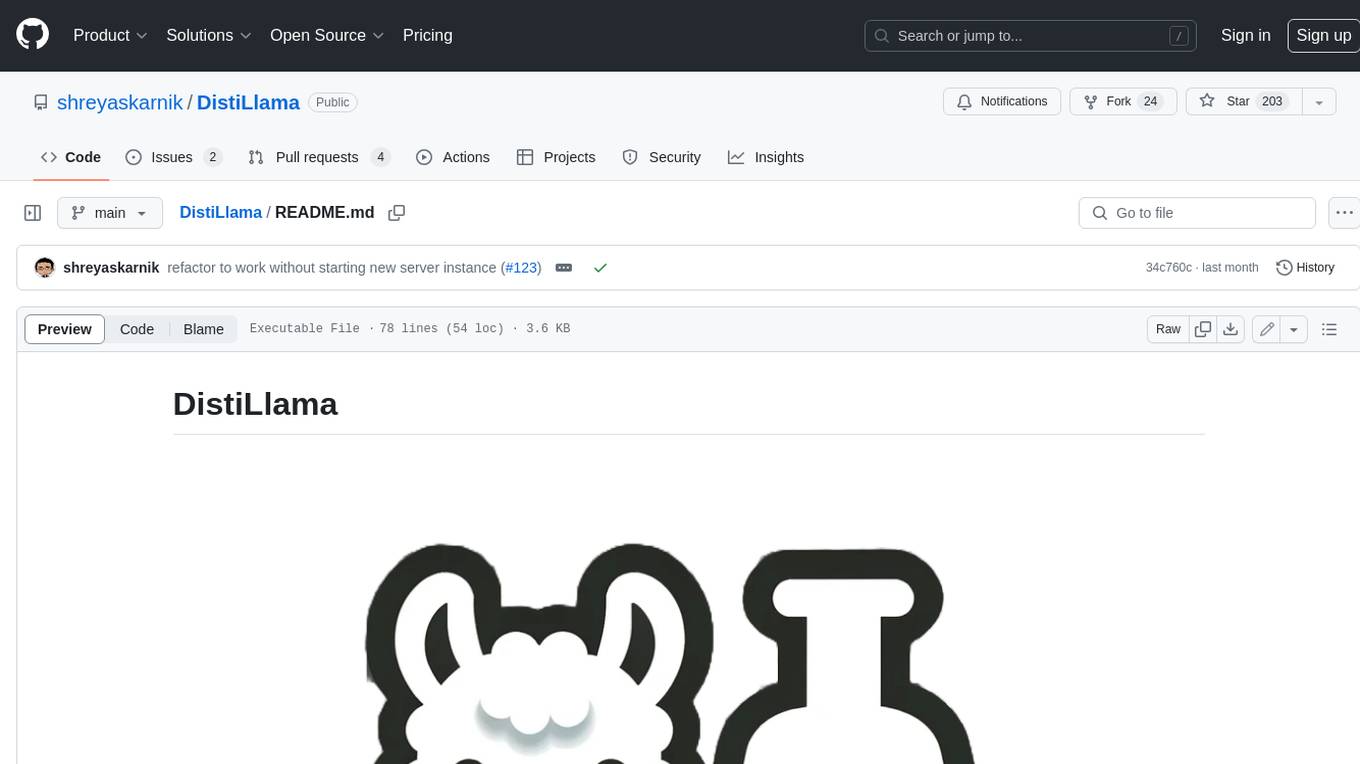
DistiLlama
DistiLlama is a Chrome extension that leverages a locally running Large Language Model (LLM) to perform various tasks, including text summarization, chat, and document analysis. It utilizes Ollama as the locally running LLM instance and LangChain for text summarization. DistiLlama provides a user-friendly interface for interacting with the LLM, allowing users to summarize web pages, chat with documents (including PDFs), and engage in text-based conversations. The extension is easy to install and use, requiring only the installation of Ollama and a few simple steps to set up the environment. DistiLlama offers a range of customization options, including the choice of LLM model and the ability to configure the summarization chain. It also supports multimodal capabilities, allowing users to interact with the LLM through text, voice, and images. DistiLlama is a valuable tool for researchers, students, and professionals who seek to leverage the power of LLMs for various tasks without compromising data privacy.
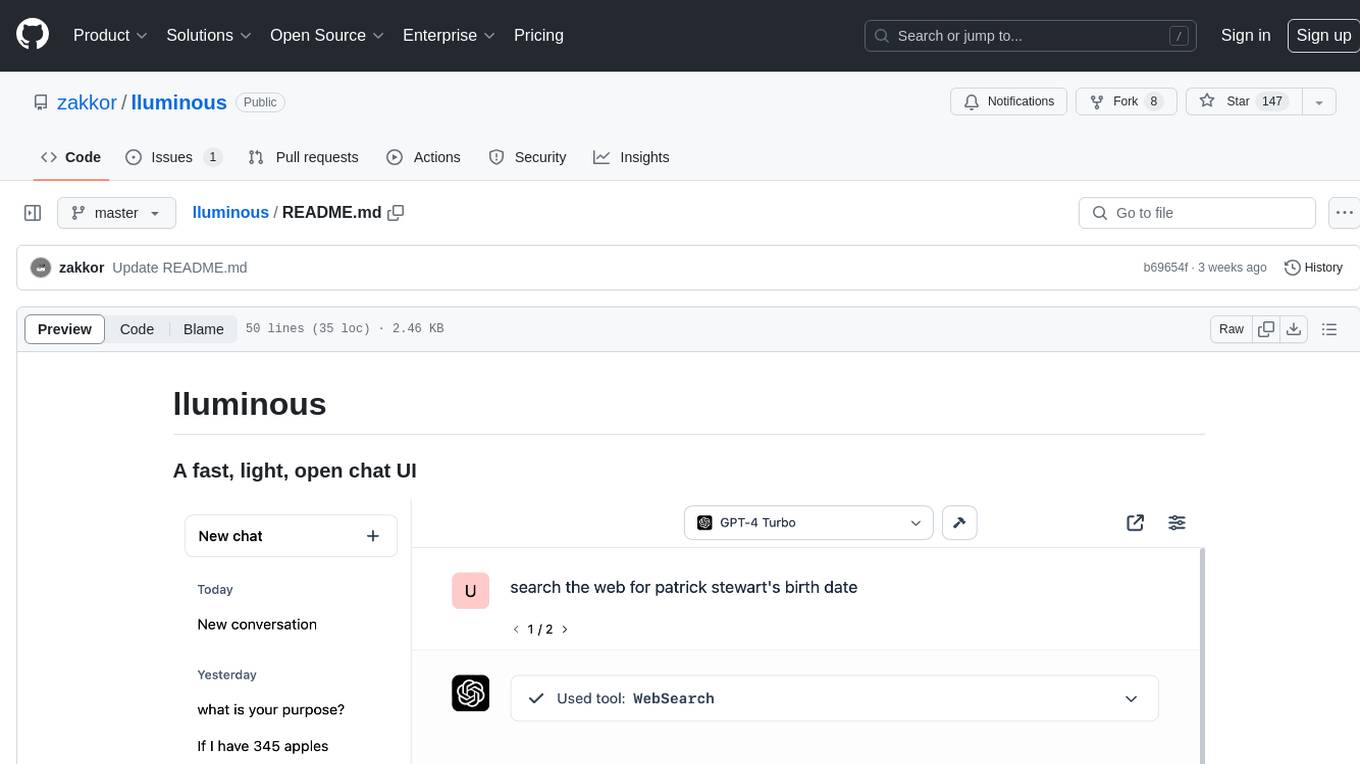
lluminous
lluminous is a fast and light open chat UI that supports multiple providers such as OpenAI, Anthropic, and Groq models. Users can easily plug in their API keys locally to access various models for tasks like multimodal input, image generation, multi-shot prompting, pre-filled responses, and more. The tool ensures privacy by storing all conversation history and keys locally on the user's device. Coming soon features include memory tool, file ingestion/embedding, embeddings-based web search, and prompt templates.
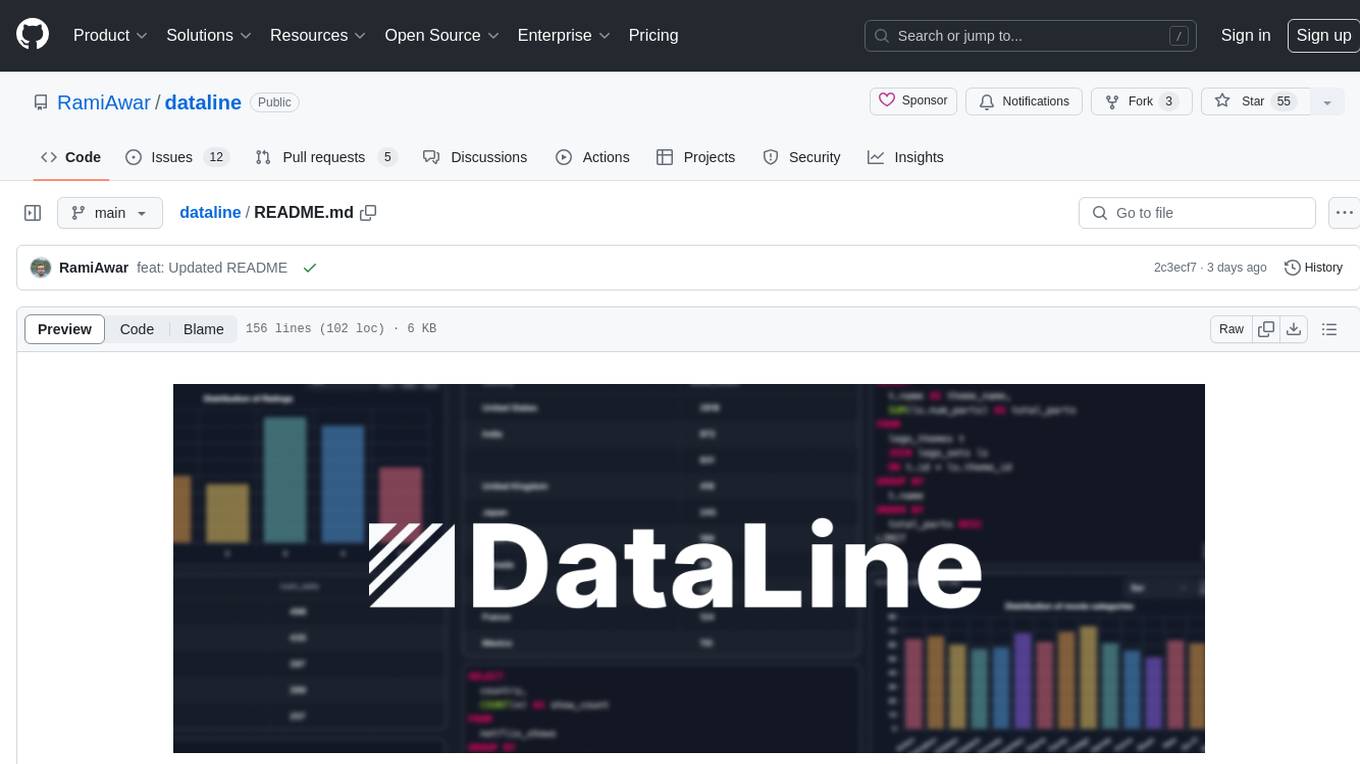
dataline
DataLine is an AI-driven data analysis and visualization tool designed for technical and non-technical users to explore data quickly. It offers privacy-focused data storage on the user's device, supports various data sources, generates charts, executes queries, and facilitates report building. The tool aims to speed up data analysis tasks for businesses and individuals by providing a user-friendly interface and natural language querying capabilities.
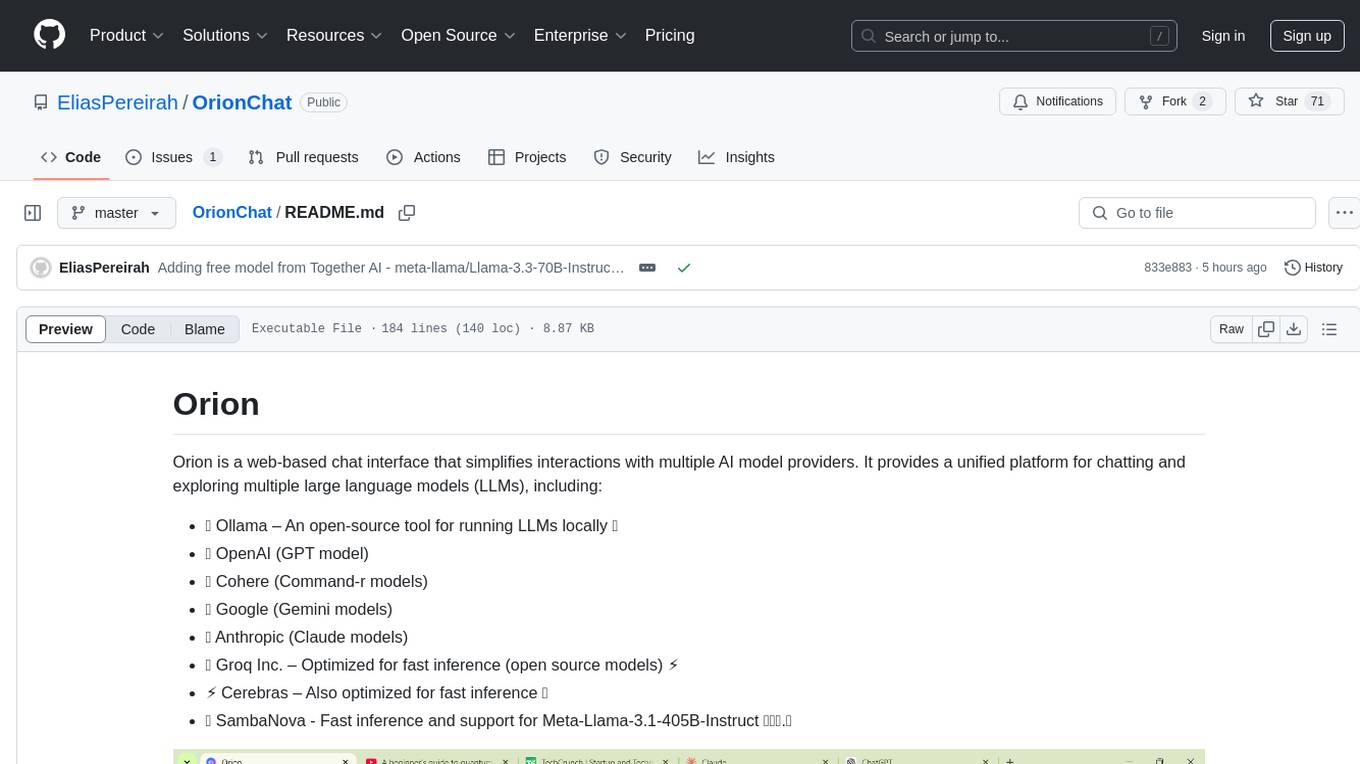
OrionChat
Orion is a web-based chat interface that simplifies interactions with multiple AI model providers. It provides a unified platform for chatting and exploring various large language models (LLMs) such as Ollama, OpenAI (GPT model), Cohere (Command-r models), Google (Gemini models), Anthropic (Claude models), Groq Inc., Cerebras, and SambaNova. Users can easily navigate and assess different AI models through an intuitive, user-friendly interface. Orion offers features like browser-based access, code execution with Google Gemini, text-to-speech (TTS), speech-to-text (STT), seamless integration with multiple AI models, customizable system prompts, language translation tasks, document uploads for analysis, and more. API keys are stored locally, and requests are sent directly to official providers' APIs without external proxies.

devika
Devika is an advanced AI software engineer that can understand high-level human instructions, break them down into steps, research relevant information, and write code to achieve the given objective. Devika utilizes large language models, planning and reasoning algorithms, and web browsing abilities to intelligently develop software. Devika aims to revolutionize the way we build software by providing an AI pair programmer who can take on complex coding tasks with minimal human guidance. Whether you need to create a new feature, fix a bug, or develop an entire project from scratch, Devika is here to assist you.
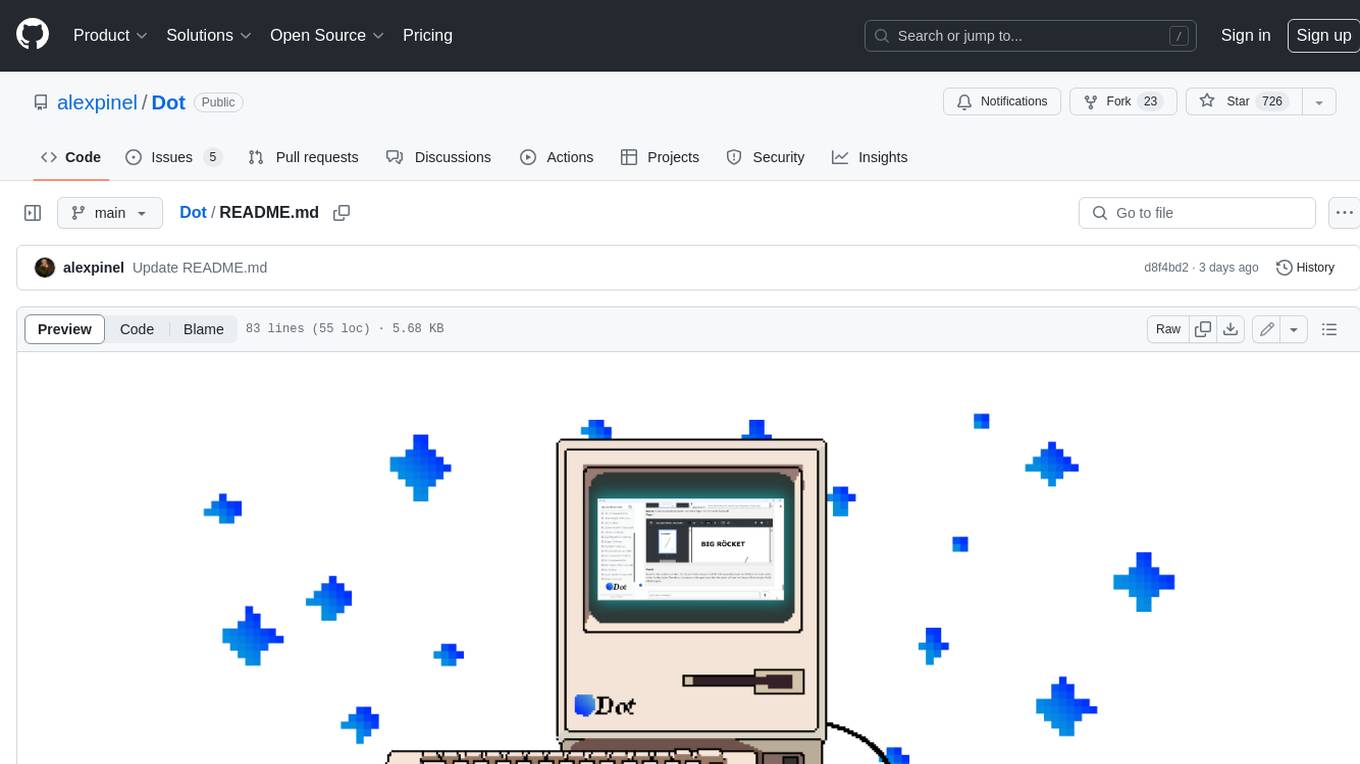
Dot
Dot is a standalone, open-source application designed for seamless interaction with documents and files using local LLMs and Retrieval Augmented Generation (RAG). It is inspired by solutions like Nvidia's Chat with RTX, providing a user-friendly interface for those without a programming background. Pre-packaged with Mistral 7B, Dot ensures accessibility and simplicity right out of the box. Dot allows you to load multiple documents into an LLM and interact with them in a fully local environment. Supported document types include PDF, DOCX, PPTX, XLSX, and Markdown. Users can also engage with Big Dot for inquiries not directly related to their documents, similar to interacting with ChatGPT. Built with Electron JS, Dot encapsulates a comprehensive Python environment that includes all necessary libraries. The application leverages libraries such as FAISS for creating local vector stores, Langchain, llama.cpp & Huggingface for setting up conversation chains, and additional tools for document management and interaction.
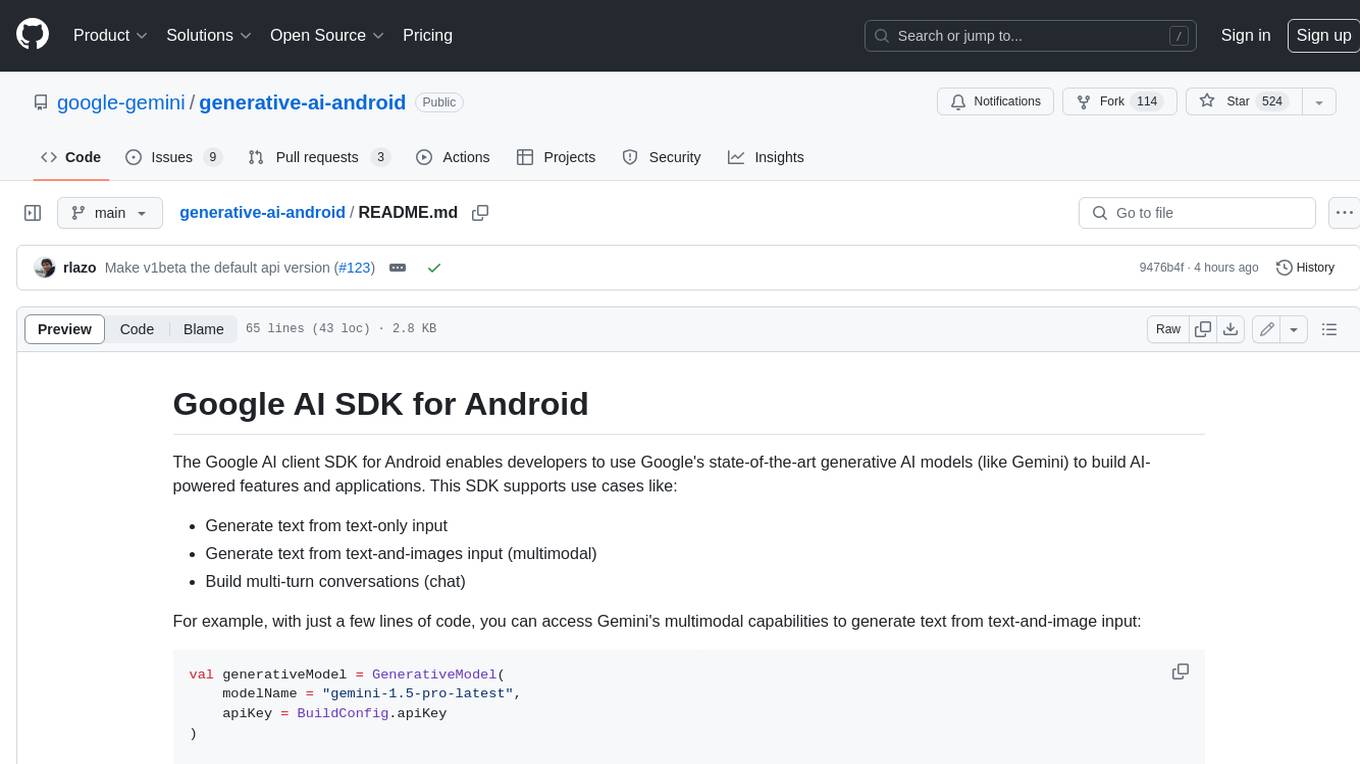
generative-ai-android
The Google AI client SDK for Android enables developers to use Google's state-of-the-art generative AI models (like Gemini) to build AI-powered features and applications. This SDK supports use cases like: - Generate text from text-only input - Generate text from text-and-images input (multimodal) - Build multi-turn conversations (chat)
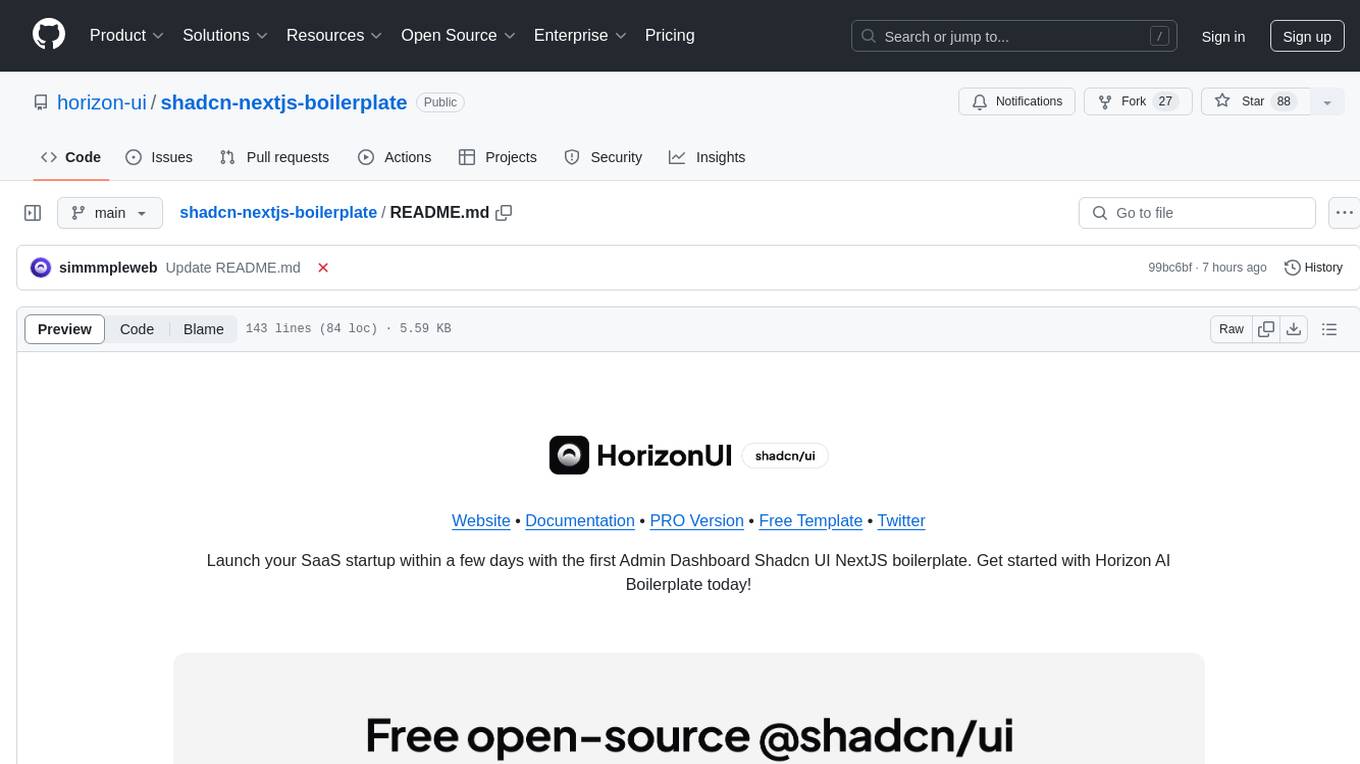
shadcn-nextjs-boilerplate
Horizon AI Boilerplate is an open-source Admin Dashboard template designed for Shadcn UI, NextJS, and Tailwind CSS. It provides over 30 dark/light frontend elements for creating Chat AI SaaS Apps quickly. The documentation is detailed and complex, guiding users through installation and usage. Users can start their local server with simple commands. The tool requires a valid OpenAI API key for ChatGPT functionality. Additionally, a Figma version is available for design purposes. The PRO version offers more components and pages. Users can report issues on GitHub and connect with the community via Discord. The tool credits open-source resources like Shadcn UI Library, NextJS Subscription Payments, and ChatBot UI by mckaywrigley.
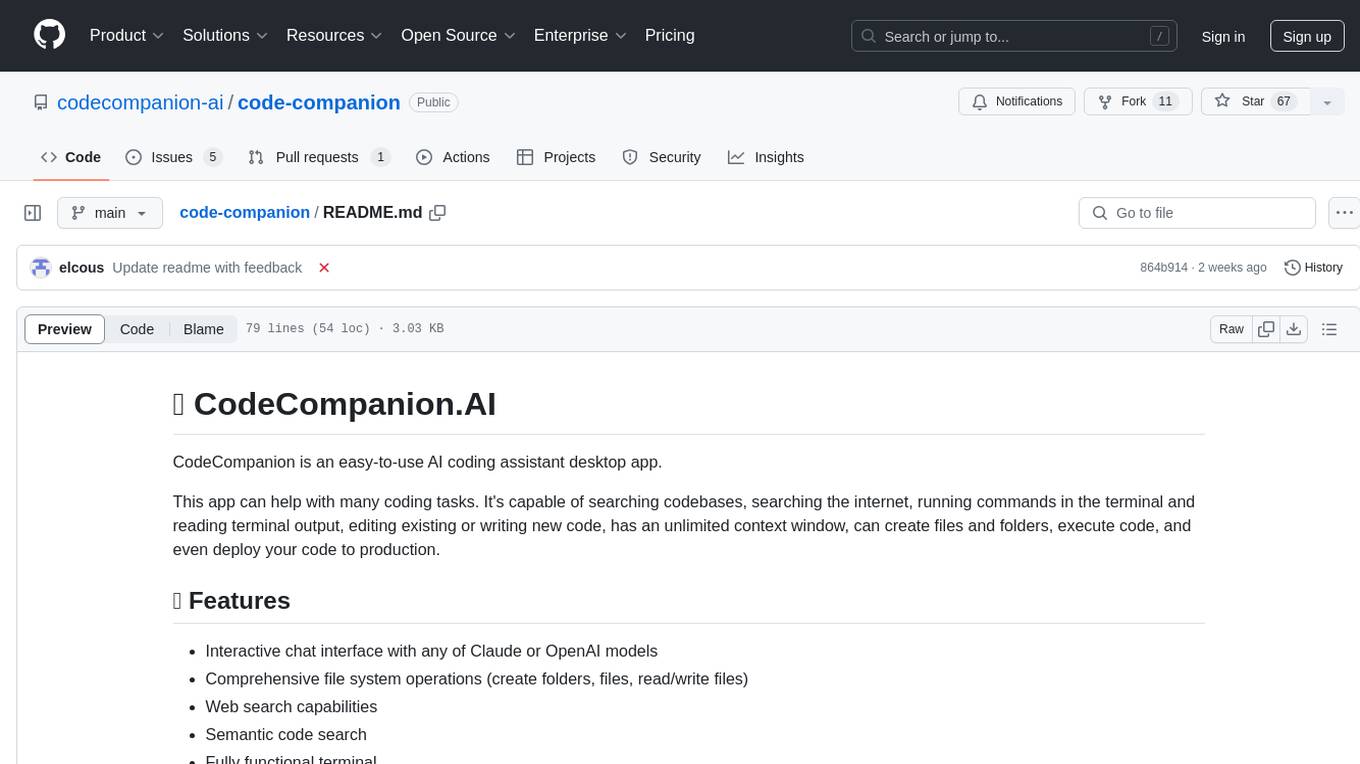
code-companion
CodeCompanion.AI is an AI coding assistant desktop app that helps with various coding tasks. It features an interactive chat interface, file system operations, web search capabilities, semantic code search, a fully functional terminal, code preview and approval, unlimited context window, dynamic context management, and more. Users can save chat conversations and set custom instructions per project.
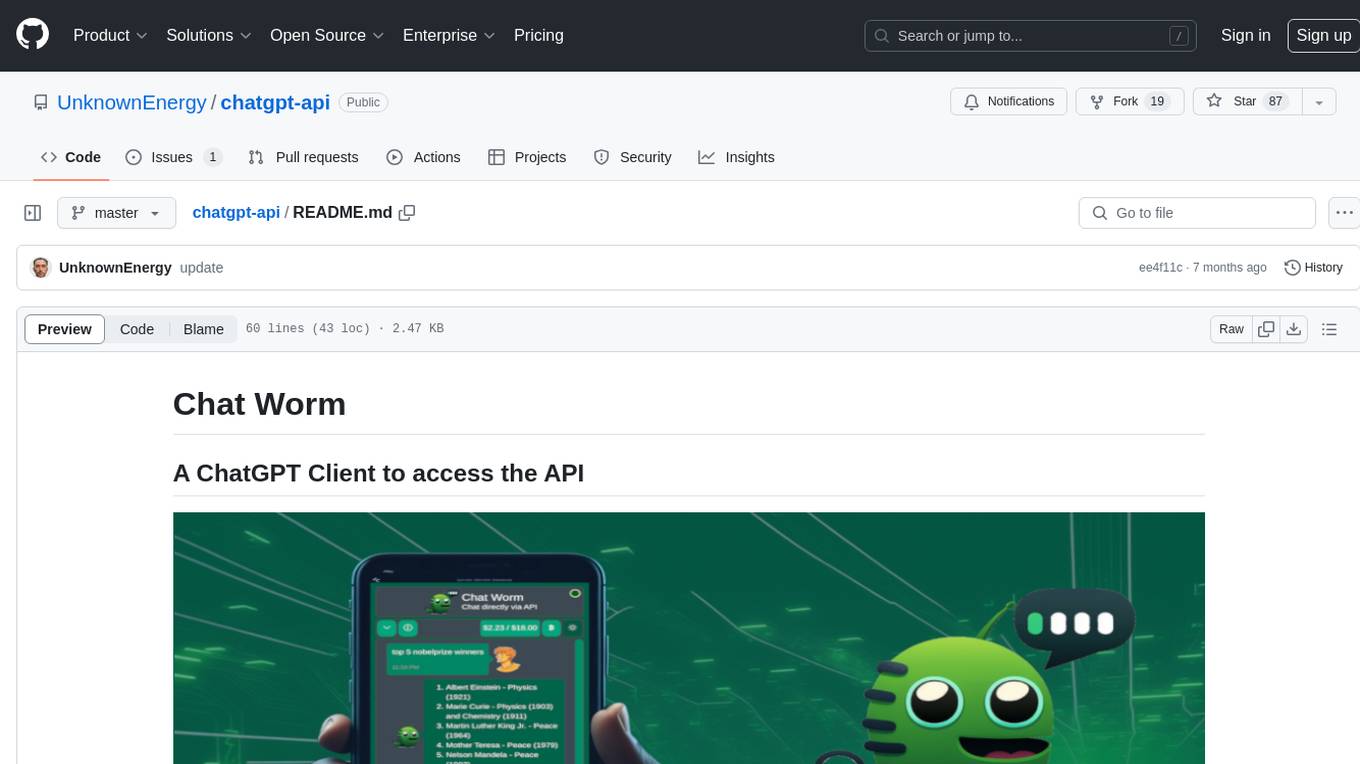
chatgpt-api
Chat Worm is a ChatGPT client that provides access to the API for generating text using OpenAI's GPT models. It works as a single-page application directly communicating with the API, allowing users to interact with the latest GPT-4 model if they have access. The project includes web, Android, and Windows apps for easy access. Users can set up local development, contribute improvements via pull requests, report bugs or request features on GitHub, deploy to production servers, and release on different app stores. The project is licensed under the MIT License.
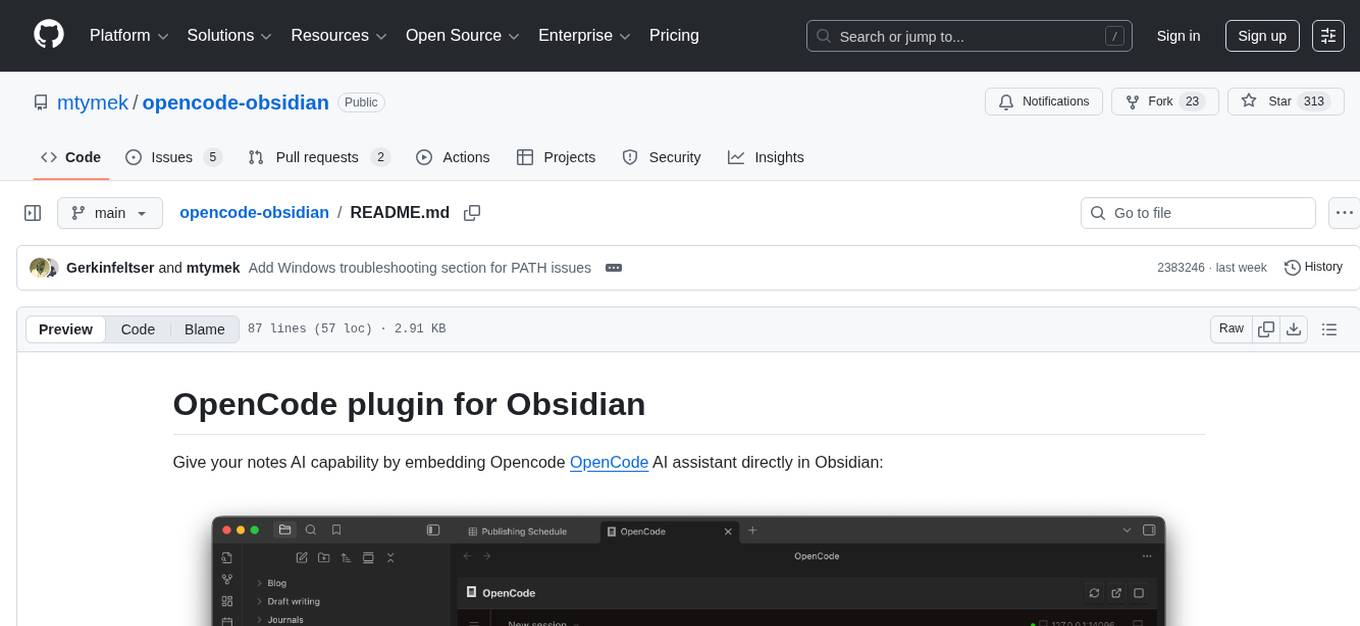
opencode-obsidian
The Opencode plugin for Obsidian allows users to give their notes AI capability by embedding Opencode OpenCode AI assistant directly in Obsidian. Users can summarize and distill long-form content, draft, edit, and refine writing, query and explore their knowledge base, and generate outlines and structured notes. The plugin uses OpenCode's web view embedded directly into the Obsidian window, providing full power without the need for a custom chat UI. It is a third-party software and requires Node.js child processes, OpenCode CLI, and Bun for installation and usage.
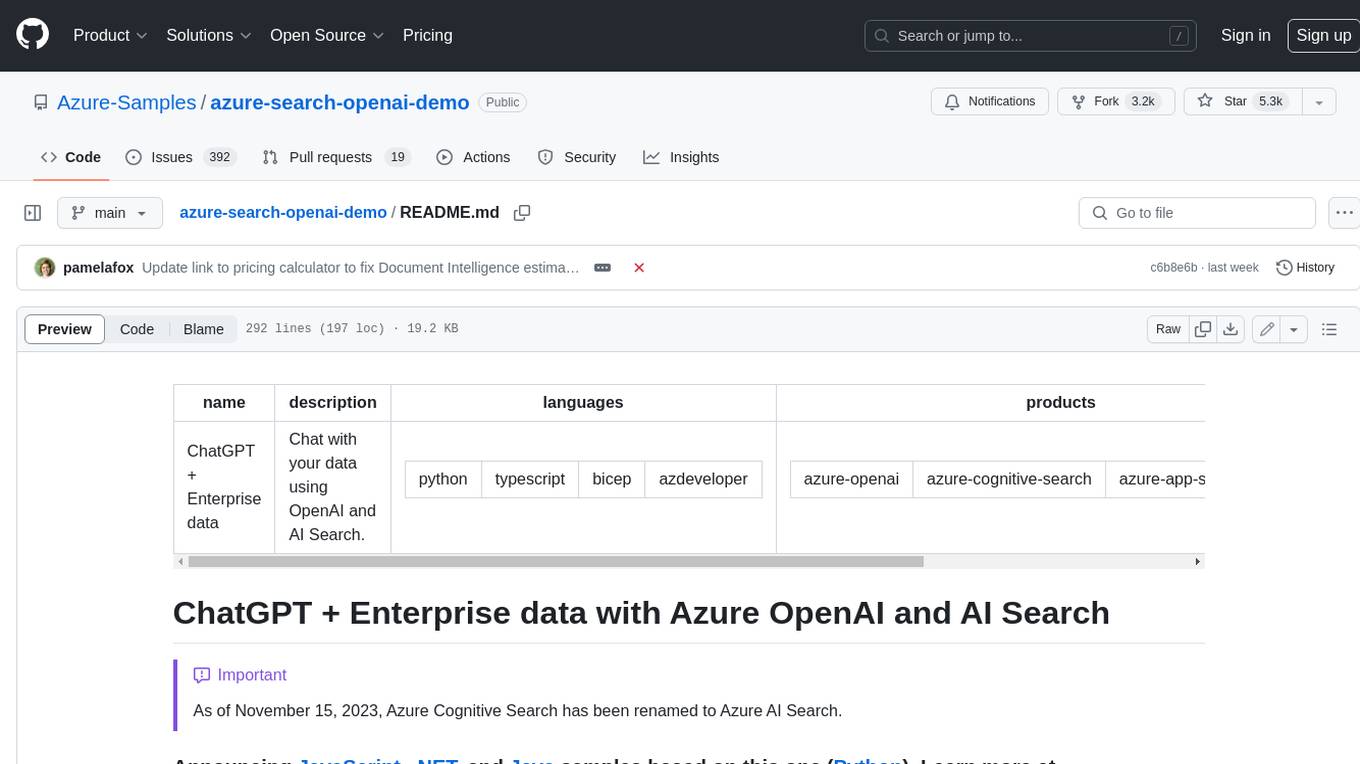
azure-search-openai-demo
This sample demonstrates a few approaches for creating ChatGPT-like experiences over your own data using the Retrieval Augmented Generation pattern. It uses Azure OpenAI Service to access a GPT model (gpt-35-turbo), and Azure AI Search for data indexing and retrieval. The repo includes sample data so it's ready to try end to end. In this sample application we use a fictitious company called Contoso Electronics, and the experience allows its employees to ask questions about the benefits, internal policies, as well as job descriptions and roles.
For similar tasks

llamatutor
Llama Tutor is an open source AI personal tutor powered by Llama 3 70B & Together.ai. It utilizes a tech stack including Llama 3.1 70B, Together AI, Next.js app router with Tailwind, Serper for the search API, Helicone for observability, and Plausible for website analytics. Users can clone the repo, set up accounts for necessary APIs, configure environment variables, and run the app locally. Future tasks include adding share & copy buttons, follow-up questions, splitting pages, organizing icons, enhancing the landing page, implementing a mobile menu, exploring generative UI, and improving dropdowns.
For similar jobs

sweep
Sweep is an AI junior developer that turns bugs and feature requests into code changes. It automatically handles developer experience improvements like adding type hints and improving test coverage.

teams-ai
The Teams AI Library is a software development kit (SDK) that helps developers create bots that can interact with Teams and Microsoft 365 applications. It is built on top of the Bot Framework SDK and simplifies the process of developing bots that interact with Teams' artificial intelligence capabilities. The SDK is available for JavaScript/TypeScript, .NET, and Python.

ai-guide
This guide is dedicated to Large Language Models (LLMs) that you can run on your home computer. It assumes your PC is a lower-end, non-gaming setup.

classifai
Supercharge WordPress Content Workflows and Engagement with Artificial Intelligence. Tap into leading cloud-based services like OpenAI, Microsoft Azure AI, Google Gemini and IBM Watson to augment your WordPress-powered websites. Publish content faster while improving SEO performance and increasing audience engagement. ClassifAI integrates Artificial Intelligence and Machine Learning technologies to lighten your workload and eliminate tedious tasks, giving you more time to create original content that matters.

chatbot-ui
Chatbot UI is an open-source AI chat app that allows users to create and deploy their own AI chatbots. It is easy to use and can be customized to fit any need. Chatbot UI is perfect for businesses, developers, and anyone who wants to create a chatbot.

BricksLLM
BricksLLM is a cloud native AI gateway written in Go. Currently, it provides native support for OpenAI, Anthropic, Azure OpenAI and vLLM. BricksLLM aims to provide enterprise level infrastructure that can power any LLM production use cases. Here are some use cases for BricksLLM: * Set LLM usage limits for users on different pricing tiers * Track LLM usage on a per user and per organization basis * Block or redact requests containing PIIs * Improve LLM reliability with failovers, retries and caching * Distribute API keys with rate limits and cost limits for internal development/production use cases * Distribute API keys with rate limits and cost limits for students

uAgents
uAgents is a Python library developed by Fetch.ai that allows for the creation of autonomous AI agents. These agents can perform various tasks on a schedule or take action on various events. uAgents are easy to create and manage, and they are connected to a fast-growing network of other uAgents. They are also secure, with cryptographically secured messages and wallets.

griptape
Griptape is a modular Python framework for building AI-powered applications that securely connect to your enterprise data and APIs. It offers developers the ability to maintain control and flexibility at every step. Griptape's core components include Structures (Agents, Pipelines, and Workflows), Tasks, Tools, Memory (Conversation Memory, Task Memory, and Meta Memory), Drivers (Prompt and Embedding Drivers, Vector Store Drivers, Image Generation Drivers, Image Query Drivers, SQL Drivers, Web Scraper Drivers, and Conversation Memory Drivers), Engines (Query Engines, Extraction Engines, Summary Engines, Image Generation Engines, and Image Query Engines), and additional components (Rulesets, Loaders, Artifacts, Chunkers, and Tokenizers). Griptape enables developers to create AI-powered applications with ease and efficiency.
